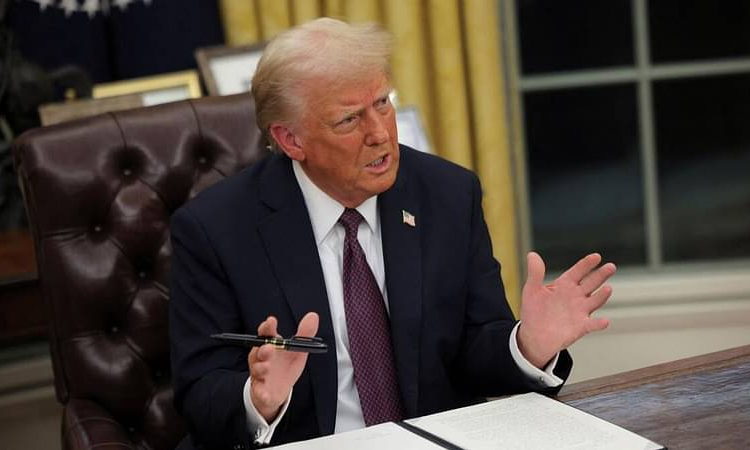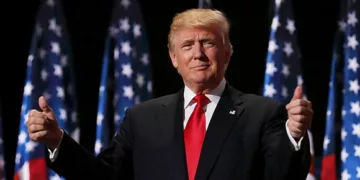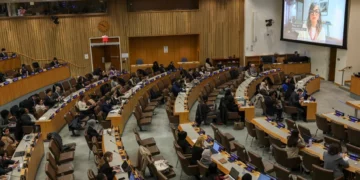The longstanding Nigeria-United States diplomatic relations are facing turbulent times following the precarious imposition of a 14 percent tariff on Nigerian goods entering the US by President Donald Trump.
A cursory look into the contending issues between the US and Nigeria will be viewed from the wider global implications of the torrent of tariffs imposed on several countries by Trump on Wednesday.
African countries were slammed with varying degrees of tariffs with little Lesotho leading with 50%, Madagascar with 47%, South Africa with 30% and Nigeria with 14% while several other African countries were not spared the 10% baseline tariff.
Trump’s Tariffs: Experts Challenge Nigeria, Others On Regional Integration
However, Nigeria’s Minister of Foreign Affairs, Ambassador Yusuf Maitama Tuggar, believes that the Nigeria- US relations still have more prospects during a recent inaugural virtual meeting with the United States deputy Secretary of State, Christopher Landau, to discuss areas of mutual interest between both countries.
During the meeting, Tuggar and Landau highlighted key areas of cooperation, including energy, technology, trade, human capital development, security, religious freedom, and immigration. Minister Tuggar reaffirmed Nigeria’s readiness to partner with the new Trump administration to foster shared goals and enhance bilateral relations.
Emphasizing Nigeria’s commitment to structured migration solutions, Tuggar pointed to initiatives such as the Technical Aide Corps (TAC), which deploys Nigerian professionals to other nations to support development efforts. He stressed that such programs provide a more organized approach to migration while benefiting both Nigeria and its international partners.
Deputy Secretary of State, Christopher Landau, reiterated the United States’ commitment to a strong and enduring partnership with Nigeria, highlighting the importance of strengthening commercial ties, enhancing security collaboration, and deepening diplomatic engagements.
The meeting marks the first high-level engagement between Nigeria and the U.S. under the new American administration, setting the stage for continued cooperation on critical global and regional issues.
However, this meeting perhaps concluded before Trump slammed his slew of tariffs otherwise this would have been the veritable avenue to discuss this vexed issue that is today reverberating around the world with bitter reactions and threat of retaliation from several countries.
International Constitutional Law expert, Livingstone Wechie , pointed out that the Trump Tariff regime should be seen as an opportunity to review trade agreements around the world from vantage positions. He said further that the Tariff hike is owed to new alliances in the global economic space.
Specifically speaking about US- Nigeria and US- Africa relations, the expert lamented that Nigeria and other African countries have marginal benefits from the US under the African Growth and Opportunity Act(AGOA), stressing that leaders of the continent must brace up for the new global challenge.
He said “Africa has for some time now survived on the American legislative handout called AGOA, which expires this year with no hope of renewal under a Trump administration. This numb piece of legislation of limited life expectancy that purportedly promised to stimulate industrialisation in Africa was such a caricature and a pipe dream that made Africa totally reliant on “foreign aid”. Expectedly, it has exposed our self-inflicted vulnerability which is owed to our lack of the sense of value to the world.”
He agreed that President Trump’s tariffs threw the world into turmoil, but said the specific needs of the continent are unlikely to be a priority on the global policy table, which Africa must take seriously if indeed the continent is ready.
“However, this development will offer American competitors such as Russia, China, India the opportunity to take new trade grounds with the weaker states to go for alternative alliances to further subjugate them for want of any option.
“It is sad that for Africa, it has unwisely taken instructions from the World Bank and International Monetary Fund (IMF) at its own peril. Now it has limited alternatives than to either keep being a dump site or take bold steps for its prosperity.
“It is troubling to note that Nigeria “the world poverty capital “, is still in the shackles of a cost-of-living crisis that has led to high levels of hunger and insecurity. South Africa, on its part, grapples with some of the highest levels of unemployment in the world, with an estimated six out of 10 people out of a job. It is my considered opinion that a 25-percent blanket tariff would be a “worst case scenario”.
On the solution, Wechie believes that Africa and indeed Nigeria must pass the narrow path of expanding its markets, seek to renegotiate its trade relationship with Washington with concessions, explore new markets, break down borders walls imposed the Berlin Wall that have impeded market growth, take up the issue of a free trade zone as a continental emergency by enforcing the African Continental Free-trade area.
“The African Continental Free Trade Area (AfCFTA), a trade pact brokered by the African Union (AU) remains a fallback plan for the continent. This slowed down initiative was meant to create a single market for goods and services across the continent, fostering economic integration, triggering investment and boosting intra-African trade,” he said.





